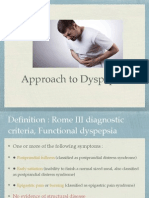What Is Peptic Ulcer Disease
What Is Peptic Ulcer Disease
Uploaded by
Karl Angelo SimbajonCopyright:
Available Formats
What Is Peptic Ulcer Disease
What Is Peptic Ulcer Disease
Uploaded by
Karl Angelo SimbajonOriginal Title
Copyright
Available Formats
Share this document
Did you find this document useful?
Is this content inappropriate?
Copyright:
Available Formats
What Is Peptic Ulcer Disease
What Is Peptic Ulcer Disease
Uploaded by
Karl Angelo SimbajonCopyright:
Available Formats
KARL ANGELO SIMBAJON 137L
What Is Peptic Ulcer Disease?
Peptic ulcer disease refers to painful sores or ulcers in the lining of the stomach or first part of the small intestine, called the duodenum. What Causes Ulcers? No single cause has been found for ulcers. However, it is now clear that an ulcer is the end result of an imbalance between digestive fluids in the stomach and duodenum. Ulcers can be caused by: Infection with a type of bacteria called Helicobacter pylori (H. pylori) Use of painkillers called nonsteroidal anti-inflammatory drugs (NSAIDs), such as aspirin, naproxen (Aleve, Anaprox, Naprosyn, and others), ibuprofen (Motrin, Advil, Midol, and others), and many others available by prescription. Even aspirin coated with a special substance can still cause ulcers. Excess acid production from gastrinomas, tumors of the acid producing cells of the stomach that increases acid output; seen in Zollinger-Ellison syndrome.
What Are the Symptoms of an Ulcer? An ulcer may or may not have symptoms. When symptoms occur, they include: A gnawing or burning pain in the middle or upper stomach between meals or at night Bloating Heartburn Nausea or vomiting
In severe cases, symptoms can include: How Serious Is an Ulcer? Though ulcers often heal on their own, you shouldn't ignore their warning signs. If not properly treated, ulcers can lead to serious health problems, including: Bleeding Perforation (a hole through the wall of the stomach) Gastric outlet obstruction from swelling or scarring that blocks the passageway leading from the stomach to the small intestine. Dark or black stool (due to bleeding) Vomiting blood (can have a "coffee-grounds" appearance) Weight loss Severe pain in the mid to upper abdomen
Taking NSAIDs can cause any of the above without warning. The risk is especially concerning for the elderly and for those with a prior history of having peptic ulcer disease.
KARL ANGELO SIMBAJON 137L
Who Is More Likely to Get Ulcers? You may be more likely to develop ulcers if you: Are infected with the H. pylori bacterium Take NSAIDs such as aspirin, ibuprofen, naproxen, and many others Have a family history of ulcers Have another illness, such as liver, kidney, or lung disease Drink alcohol regularly Are 50 years old or older
How Are Ulcers Diagnosed? Your doctor may be able to make an ulcer diagnosis just by talking with you about your symptoms. However, to confirm the diagnosis one of several tests should be taken. First, your doctor may ask you to take an acid-blocking medication such as those used to treat heartburn for a short period of time to see if your symptoms improve. If needed, your doctor may recommend a procedure called an upper endoscopy. It involves inserting a small, lighted tube (endoscope) through the throat and into the stomach to look for abnormalities. This procedure is usually given if you are having severe symptoms of ulcers. Often, doctors will frequently treat without confirming the diagnosis using endoscopy. If the cause is not likely to be from NSAIDs, then it is very likely to be from H. pylori. Most doctors will now test for H. pylori and will treat specifically for that in addition to giving medications to reduce the symptoms. How Are Ulcers Treated? Though ulcers often heal on their own, you shouldn't ignore their warning signs. If not properly treated, ulcers can lead to serious health problems. There are several ways in which ulcers can be treated, including making changes to ones lifestyle, taking medication, and/or undergoing surgery. Lifestyle Changes to Treat an Ulcer To treat an ulcer, first eliminate substances that can be causing the ulcers. If you smoke or drink alcohol, stop. If the ulcer is believed to be caused by the use of NSAIDs, they need to be stopped. Ulcer Medications Ulcer medications can include: Proton pump medications (PPI). Proton pump medications reduce acid levels and allow the ulcer to heal. They include Prilosec, Prevacid, Aciphex, Protonix, Kapidex, Zegerid, and Nexium. Antibiotics. If you have H. pylori infection, then antibiotics are used. There are multiple combinations of antibiotics that are taken for one to two weeks along with a PPI. Some doctors also recommend taking Pepto-Bismol. Upper Endoscopy. Some bleeding ulcers can be treated through the endoscope. Surgery. Sometimes an operation is needed if the ulcer has created a hole in the wall of the stomach or if there is serious bleeding.
KARL ANGELO SIMBAJON 137L
Will Drinking Milk Help Cure an Ulcer? No. Milk can make your ulcer worse. Milk provides brief relief of ulcer pain because it coats the stomach lining. But milk can also stimulate your stomach to produce more acid and digestive juices, which can aggravate ulcers. How Can I Prevent Ulcers? To try and prevent ulcers from developing: Don't smoke. Avoid alcohol. Don't overuse aspirin and/or NSAIDs. If you have symptoms of an ulcer, contact your doctor.
You might also like
- Golf Course Valuation TechniquesDocument4 pagesGolf Course Valuation TechniquesJenNo ratings yet
- Peptic UlcerDocument5 pagesPeptic UlcermerobabuNo ratings yet
- Gastric Outlet Obstruction, A Simple Guide To The Condition, Diagnosis, Treatment And Related ConditionsFrom EverandGastric Outlet Obstruction, A Simple Guide To The Condition, Diagnosis, Treatment And Related ConditionsNo ratings yet
- DyspepsiaDocument28 pagesDyspepsiaKrairat Komdee100% (1)
- Ulcerative ColitisDocument7 pagesUlcerative ColitisShaira Anne Fuentes BaroniaNo ratings yet
- OsteomalaciaDocument8 pagesOsteomalaciaRudhira KatragaddaNo ratings yet
- Gerd PDFDocument51 pagesGerd PDFmonir61No ratings yet
- DyspepsiaDocument7 pagesDyspepsiaLuvlie SomcioNo ratings yet
- Are Viruses Living or Non-Living Organisms?Document8 pagesAre Viruses Living or Non-Living Organisms?Sydney Cloyce NagalNo ratings yet
- HyperphosphatemiaDocument2 pagesHyperphosphatemiatephNo ratings yet
- 1 - Presentation - Management of Preclamplsia, Mild and ModerateDocument22 pages1 - Presentation - Management of Preclamplsia, Mild and ModeratesharonNo ratings yet
- Pernicious Anemia - MitchDocument18 pagesPernicious Anemia - Mitchthalafuj100% (1)
- Reye SyndromeDocument10 pagesReye SyndromeDanil KhairulNo ratings yet
- Endometrial Polyps: Irregular Menstrual BleedingDocument4 pagesEndometrial Polyps: Irregular Menstrual BleedingLuke ObusanNo ratings yet
- Philippine Urological Association, Inc.: Executive Committee and Board Members 1997Document12 pagesPhilippine Urological Association, Inc.: Executive Committee and Board Members 1997mits98No ratings yet
- ITP Explained in Detail - Good OneDocument5 pagesITP Explained in Detail - Good Onemaheshbendigeri5945No ratings yet
- PreeclampsiaDocument34 pagesPreeclampsiaTrigo Puro100% (1)
- Rednisolone Rednisone: Atient Nformation OnDocument4 pagesRednisolone Rednisone: Atient Nformation OnYoona LuNo ratings yet
- GoutDocument5 pagesGoutDe Sesto Rhys Carlo100% (2)
- 494x Celiac Powerpoint MB RevDocument21 pages494x Celiac Powerpoint MB Revkhalito1991No ratings yet
- Overdose and PoisoningDocument4 pagesOverdose and PoisoningMahmoud SelimNo ratings yet
- Ulcer A 42008Document19 pagesUlcer A 42008postbasicNo ratings yet
- InfluenzaDocument2 pagesInfluenzajohnndoeeNo ratings yet
- National Program of Cancer Registries Education and Training SeriesDocument93 pagesNational Program of Cancer Registries Education and Training SeriesNADEEMNo ratings yet
- Gallbladder HydropsDocument6 pagesGallbladder HydropsSaifulAnamNo ratings yet
- Grave'S Disease: Farida Ulfa 1510211057Document11 pagesGrave'S Disease: Farida Ulfa 1510211057farida ulfaNo ratings yet
- Immune Thrombocytopenia (Second Option)Document16 pagesImmune Thrombocytopenia (Second Option)Fein MalricNo ratings yet
- Disseminated Intravascular CoagulationDocument37 pagesDisseminated Intravascular CoagulationmarciantoroNo ratings yet
- Hepatobiliary Disorders 2Document21 pagesHepatobiliary Disorders 2KatrinaJimenezNo ratings yet
- Pathophysiology of Peptic Ulcer DiseaseDocument1 pagePathophysiology of Peptic Ulcer DiseaseJhade RelletaNo ratings yet
- GERD - PPT 11Document30 pagesGERD - PPT 11pharmaguy111No ratings yet
- Infographic: Facts On Breast CancerDocument1 pageInfographic: Facts On Breast CanceredsunonlineNo ratings yet
- 13.drugs For GI - Part IDocument38 pages13.drugs For GI - Part ILee BoborasNo ratings yet
- Imperforate AnusDocument2 pagesImperforate AnusTeofista Bartolome100% (1)
- Fosfomycin TromethamineDocument9 pagesFosfomycin Tromethamine:)No ratings yet
- GastroenteritisDocument24 pagesGastroenteritisMomogi ForeverhappyNo ratings yet
- Dysmenorrhea Definition PDFDocument14 pagesDysmenorrhea Definition PDFYogi HermawanNo ratings yet
- Current Treatment of Dyspepsia: DR Wita Kartika Nurani SP - PDDocument15 pagesCurrent Treatment of Dyspepsia: DR Wita Kartika Nurani SP - PDAditya Rangga FandiartaNo ratings yet
- Vitamin B6 (Pyridoxine) : OverviewDocument5 pagesVitamin B6 (Pyridoxine) : OverviewAifaa Hazwani Mukhtar AffandiNo ratings yet
- Pathophysiology of EsophagusDocument36 pagesPathophysiology of EsophagusShivani Lal0% (1)
- Gout N Osteoporasis GaganDocument33 pagesGout N Osteoporasis GaganGaganpreet Kaur0% (1)
- GastroenteritisDocument27 pagesGastroenteritisJhoanna Jhoi Alves VarillaNo ratings yet
- DiarrhoeaDocument3 pagesDiarrhoeaIbrahim AbdullahNo ratings yet
- Oleh: Fina Khairunnisa: Diagnosis and Treatment of Gastroesophageal Reflux DiseaseDocument14 pagesOleh: Fina Khairunnisa: Diagnosis and Treatment of Gastroesophageal Reflux DiseaseFina KhairunnisaNo ratings yet
- Myocardial InfarctionDocument25 pagesMyocardial Infarctionfam111222No ratings yet
- Otitis MediaDocument7 pagesOtitis MediaNorminaKiramAkmadNo ratings yet
- DB31 - Pathophysiology of Diabetes Mellitus and HypoglycemiaDocument5 pagesDB31 - Pathophysiology of Diabetes Mellitus and HypoglycemiaNeil Alcazaren かわいいNo ratings yet
- HIV Treatment 2Document3 pagesHIV Treatment 2kimglaidyl bontuyanNo ratings yet
- Anemias PharmacotherapyDocument27 pagesAnemias Pharmacotherapy1108010091No ratings yet
- Antihyperglycemic Agents Comparison ChartDocument9 pagesAntihyperglycemic Agents Comparison ChartBonnieNo ratings yet
- Urinary IncontinenceDocument20 pagesUrinary IncontinenceSEIYADU IBRAHIM KNo ratings yet
- Case Study NSTEMIDocument35 pagesCase Study NSTEMInikaaraaaNo ratings yet
- Function of G I System: The Primary Digestive Functions Are Break Down Food Particles "Document113 pagesFunction of G I System: The Primary Digestive Functions Are Break Down Food Particles "cherryann_12100% (1)
- Endocrine Med-Surg Slide Show Presentation (Nursing)Document43 pagesEndocrine Med-Surg Slide Show Presentation (Nursing)loveoverprideNo ratings yet
- Metformin, Glucophage, Glucophage XR, Glumetza, Fortamet, RiometDocument5 pagesMetformin, Glucophage, Glucophage XR, Glumetza, Fortamet, RiometAgronaSlaughterNo ratings yet
- HypertensionDocument4 pagesHypertensionKhaira CharmagneNo ratings yet
- Blunt Abdominal TraumaDocument65 pagesBlunt Abdominal TraumaAmit MishraNo ratings yet
- A Simple Guide to Mallory Weiss Syndrome, Diagnosis, Treatment and Related ConditionsFrom EverandA Simple Guide to Mallory Weiss Syndrome, Diagnosis, Treatment and Related ConditionsNo ratings yet
- Hereditary Spherocytosis, A Simple Guide To The Condition, Diagnosis, Treatment And Related ConditionsFrom EverandHereditary Spherocytosis, A Simple Guide To The Condition, Diagnosis, Treatment And Related ConditionsNo ratings yet
- BS Final AssignmentDocument3 pagesBS Final AssignmentVidya Sagar ChowdaryNo ratings yet
- Post GATE-Admission 2020 IITs - CSDocument66 pagesPost GATE-Admission 2020 IITs - CSshubham gandhiNo ratings yet
- Cytology I - Techniques and Application: Peter NG Cyto Lab Ic, MT, PYNEHDocument201 pagesCytology I - Techniques and Application: Peter NG Cyto Lab Ic, MT, PYNEHbusiness onlyyou100% (1)
- Strengthen Weaken Mastery PracticeDocument97 pagesStrengthen Weaken Mastery PracticeDheeraj SinghNo ratings yet
- Universidad Abierta para Adultos: (Uapa)Document5 pagesUniversidad Abierta para Adultos: (Uapa)Pablo LopezNo ratings yet
- Ahmedabad Rajkot: 5:30 AM 10:00 AMDocument3 pagesAhmedabad Rajkot: 5:30 AM 10:00 AMpunamNo ratings yet
- Chapter 2 Error Indications & Troubleshooting: 1.1 PrecautionsDocument25 pagesChapter 2 Error Indications & Troubleshooting: 1.1 PrecautionsАлексей КальченкоNo ratings yet
- Module 3 Nursing Skills Procedure On GI, Endo-Metab Concept (A)Document18 pagesModule 3 Nursing Skills Procedure On GI, Endo-Metab Concept (A)Nashebah A. BatuganNo ratings yet
- Ajmal, Et Al., 2019Document22 pagesAjmal, Et Al., 2019states mphinyaneNo ratings yet
- BEAM LG Gr.5 Module 1 - MATHEMATICSematics 5 Subsets of Whole NumbersDocument41 pagesBEAM LG Gr.5 Module 1 - MATHEMATICSematics 5 Subsets of Whole NumbersAdolf John Montero EceNo ratings yet
- EF4e Intplus AK Filetest 5bDocument3 pagesEF4e Intplus AK Filetest 5bjeanneramazanovaNo ratings yet
- ATPEMTP Study of Ferroresonance Involving HV InducDocument5 pagesATPEMTP Study of Ferroresonance Involving HV InducAhmad Thoriq Maudrey KabarekNo ratings yet
- Active Learning and Teaching MethodsDocument84 pagesActive Learning and Teaching MethodsDaisy83% (6)
- Brave Love Kit Brave Love Bible StudyDocument4 pagesBrave Love Kit Brave Love Bible StudyEstella CauaneNo ratings yet
- Communicating Authentic Assessments Result: Written Report in Assessment of Learning 2Document21 pagesCommunicating Authentic Assessments Result: Written Report in Assessment of Learning 2Grace Ann Aquino100% (1)
- Organizational CultureDocument15 pagesOrganizational CultureMohit AgrawalNo ratings yet
- UAS MKU Bhs. Inggris (GASAL 2021)Document5 pagesUAS MKU Bhs. Inggris (GASAL 2021)SyadivaNo ratings yet
- Ria 1Document3 pagesRia 1EMEKA IKECHUKWUNo ratings yet
- Department of Education Region III Division of PampangaDocument3 pagesDepartment of Education Region III Division of PampangaRosemarie CortezNo ratings yet
- All Simple Past For Grade 7Document6 pagesAll Simple Past For Grade 7me IamNo ratings yet
- 1st Periodical Test - Values 4Document5 pages1st Periodical Test - Values 4Annie LynNo ratings yet
- Caja 7600 Fro-11210cDocument34 pagesCaja 7600 Fro-11210cGUSTAVONo ratings yet
- Abul Hassan Haveli Case StudyDocument10 pagesAbul Hassan Haveli Case StudyAyush RawatNo ratings yet
- English Las Week 4 English 9 Q4Document5 pagesEnglish Las Week 4 English 9 Q4Mikaela KayeNo ratings yet
- Give The Scientific Name of The Dog Family. 2. Name Five Distinctive Characteristics of The Dog FamilyDocument71 pagesGive The Scientific Name of The Dog Family. 2. Name Five Distinctive Characteristics of The Dog FamilyJun Siguenza AmbrocioNo ratings yet
- Gary Lane RIPDocument2 pagesGary Lane RIPrh2705No ratings yet
- EEEB273 N04 - CurrentSources MOSFET x6 PDFDocument10 pagesEEEB273 N04 - CurrentSources MOSFET x6 PDFKaelan LockhartNo ratings yet
- S4 Measures of PositionDocument33 pagesS4 Measures of PositionAlice KrodeNo ratings yet
- Coordinated School Health Programs - LESSON 1Document4 pagesCoordinated School Health Programs - LESSON 1Jamaica DumasNo ratings yet

























































































